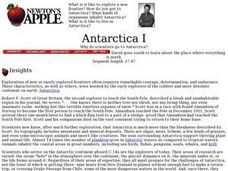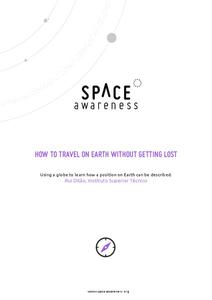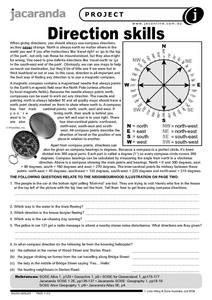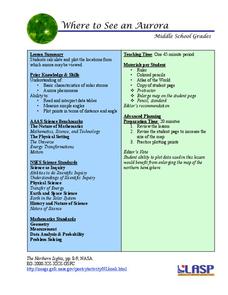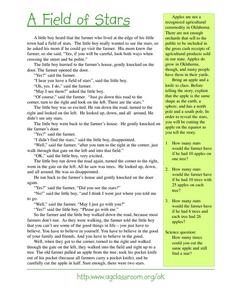Urbana School District
Magnetism
The compass was first used in 206 B.C., but we didn't discover magnetic poles until 1263 A.D. Presentation begins with the history of magnetism before continuing on to magnetic fields, magnetic forces, electromagnets, currents,...
SeaWorld
Polar Animals
Young scientists explore some of the scientific equipment that is used by explorers during expeditions to the North or South Pole. Then, they have a relay race! All of the equipment is lined up at a spot 25 yards away from the lines. The...
Curated OER
Making a Magnet / Compass
Fifth graders explore the components of a compass and how it is utilized to determine geographical directions. The magnetic field of Earth and the magnet used to magnetize the needle used in the experiment are compared and contrasted in...
Curated OER
Antarctica I
Learners explore exploring and expiditions then simlate their own on campus. They divide into small "expedition groups." Have each team report back to the class about their expeditions, using written, oral, or videotaped presentations.
Curated OER
Magnetism
In this magnetism worksheet, students answer ten questions about magnets, their magnetic poles, the magnetic lines of flux and how magnets work.
Curated OER
Grant Proposal
Students experience the creativity, anticipation and peer review of obtaining a grant for scientific research at the poles. They work in cooperative groups to assess the dynamics of polar regions. Each student proposes an original...
Mr. E. Science
Magnetism and Electromagnetism
The biggest magnet in the world is at the Los Alamos National Laboratory in New Mexico and can reach 100 tesla. By comparison, magnets that lift cars are about two tesla. The 11th presentation in this series covers magnetism, focusing on...
Curated OER
United States Map
Learners access prior knowledge and locate the North and South Poles on the map. In this mapping lesson, students understand the position of the United States relative to the poles. Learners answer questions about the globe.
Space Awareness
How To Travel On Earth Without Getting Lost
Have you ever wanted to travel the world? Take a virtual trip with a geography lesson plan that uses longitude and latitude, the position of the sun, an astronomy app, and a classroom globe.
Curated OER
Magnetic Mystery
Fourth graders investigate the poles of a magnet. In this magnet lesson, 4th graders explore what a magnet attracts and what it repels. Students view the N and S on magnets. students recognize that like poles repel and opposite poles...
Curated OER
Magnetism
Second graders conduct a variety of inquiry based learning activities. In this magnetism lesson, 2nd graders explore magnets with a partner, they learn the terms attract and repel, examine the poles of a magnet, and complete other...
Curated OER
North Or Northern?
In this direction words instructional activity, students complete a ten question multiple choice on-line interactive quiz about the correct use of direction words such as north, northern, east, eastern.
CK-12 Foundation
Location and Direction: Angle from the Equator
From any angle, this interactive is helpful. Earth science super stars explore a location's angle from the equator through a hands-on activity. Questions guide learners as they test their knowledge of direction and geometry used in...
Curated OER
Maps and Globes: Where in the World are We?
Students explore maps and globes. In this introduction to map and globe concepts lesson, students identify features of physical maps, political maps, and globes. Students locate land and water, and recite a poem about the names of the...
Curated OER
Magnets
In this magnets activity, students read for information, observe diagrams, and experiment. In this identifying the correct answer and T-Chart activity, students answer nine questions.
Curated OER
Direction Skills
For this geography worksheet, students read an excerpt on what directions tell someone. They respond to 6 short answer questions related to the neighborhood illustration found on the second page of the worksheet.
National Energy Education Development Project
Introduction to Wind Energy
The U.S. produced enough wind energy in 2015 to power all of the homes in Alaska, California, Delaware, the District of Columbia, Hawaii, Idaho, Maine, Montana, Nebraska, New Hampshire, North Dakota, Rhode Island, South Dakota, and...
American Museum of Natural History
Create a Compass
Historically, humans have used many methods of finding due north. Using a hands-on activity, learners create their own compasses. They then test their compasses in their neighborhood or to assist with stargazing.
Curated OER
Seasons and Day Time
Learners label a diagram of the Earth rotating about the sun and indicate the direction of the rotation and the seasons at each location. They indicate the seasons, the poles, the hours of daylight at each pole, the direction of rotation...
PHET
Where to See an Aurora
Where can you see an aurora in North America? After completing an astronomy activity, scholars can locate the exact coordinates. Pupils plot points of the inner and outer ring of the auroral oval and answer questions based on their...
Curated OER
Polar Expeditions
Students consider the implication of polar exploration. In this polar exploration activity, students research the expeditions that Admiral Peary, Dr. Cook, Captain Scott, and Roald Amundsen made to the North and South Poles. Students...
Curated OER
Day and Night
In this day night compare and contrast worksheet, students examine a picture of the earth and of the sun labeling day, night, equator, sun, North Pole, and South Pole.
Curated OER
A Field of Stars
Students discover the earth can be compared to the shape of an apple, having a spherical shape, and has a north and south pole. They listen to the story, "A Field of Stars" and then observe as the apple is cut open on the equator to...
Curated OER
Using the Four Main Directions in the Classroom
Students use the four main directions to locate features in the classroom. In this direction lesson, students review the 4 main directions using a world map. Students use a magnetic compass to locate the north wall in their classroom and...





